‘Sacred day’ for Manitoba RCMP: eagle feather an option for sworn oath
Read this article for free:
or
Already have an account? Log in here »
To continue reading, please subscribe:
Monthly Digital Subscription
$0 for the first 4 weeks*
- Enjoy unlimited reading on winnipegfreepress.com
- Read the E-Edition, our digital replica newspaper
- Access News Break, our award-winning app
- Play interactive puzzles
*No charge for 4 weeks then price increases to the regular rate of $19.00 plus GST every four weeks. Offer available to new and qualified returning subscribers only. Cancel any time.
Monthly Digital Subscription
$4.75/week*
- Enjoy unlimited reading on winnipegfreepress.com
- Read the E-Edition, our digital replica newspaper
- Access News Break, our award-winning app
- Play interactive puzzles
*Billed as $19 plus GST every four weeks. Cancel any time.
To continue reading, please subscribe:
Add Free Press access to your Brandon Sun subscription for only an additional
$1 for the first 4 weeks*
*Your next subscription payment will increase by $1.00 and you will be charged $16.99 plus GST for four weeks. After four weeks, your payment will increase to $23.99 plus GST every four weeks.
Read unlimited articles for free today:
or
Already have an account? Log in here »
Hey there, time traveller!
This article was published 22/01/2019 (2513 days ago), so information in it may no longer be current.
To the sounds of an eagle song and the scent of smoke from a sage smudge, nearly 90 eagle feathers were cleansed in a solemn Dakota ceremony as Manitoba RCMP launched an initiative that will give the feathers the same legal standing as the Bible for sworn statements in this province.
Each feather, with a protective beaded wrap at the bottom and contained in a specially made cloth-covered case, will be distributed to 88 RCMP detachments and sub-offices in the province.
Assistant Commissioner Scott Kolody, commanding officer of the Manitoba RCMP, described the importance of eagle feathers for Indigenous Canadians as a symbol of respect and honesty.
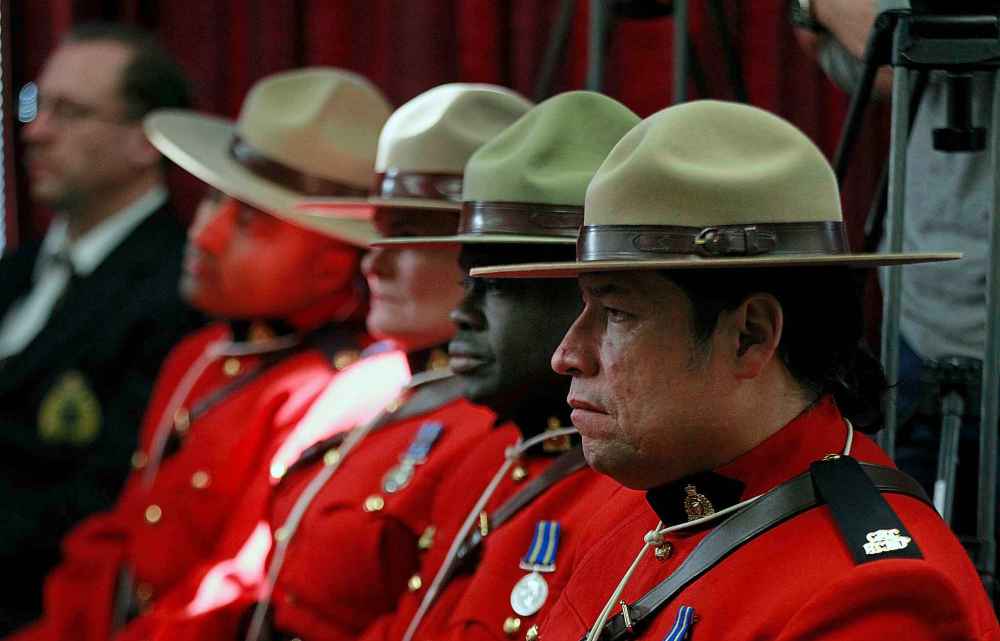
“It is our hope that this (initiative) will foster stronger relations for us,” with Indigenous communities, he told First Nations leaders, RCMP officials and other invited guests at the force’s Manitoba headquarters on Portage Avenue Tuesday.
“For some, the eagle feather provides comfort and strength. By holding an eagle feather, they find the strength to talk, and are empowered to speak their truth.”
Winnipeg Police Chief Danny Smyth attended the ceremony and expressed an interest in adopting the practice.
Nova Scotia is the only other province where RCMP have adopted the practice; it has been in place for about 15 months.
Anyone providing a sworn statement to the RCMP — officers, crime victims, witnesses and suspects — have, in addition to swearing on the Bible or affirming to tell the truth, the third option of affirming with the feather.
The statement then becomes evidence that can be used in a court of law, Kolody said.
Dakota elder Wanbdi Wakita from Sioux Valley First Nation led the cleansing ceremony with a song to the eagle spirit as his wife wafted smoke from a sage smudge over the feathers. They were laid side by side in two rows on a long table draped with a broad cloth, embroidered with RCMP insignia and gold braid. On either side of the table stood a pair of eagle staffs, one held by the Manitoba RCMP division and the other, the national RCMP staff, which is normally kept in Ottawa.
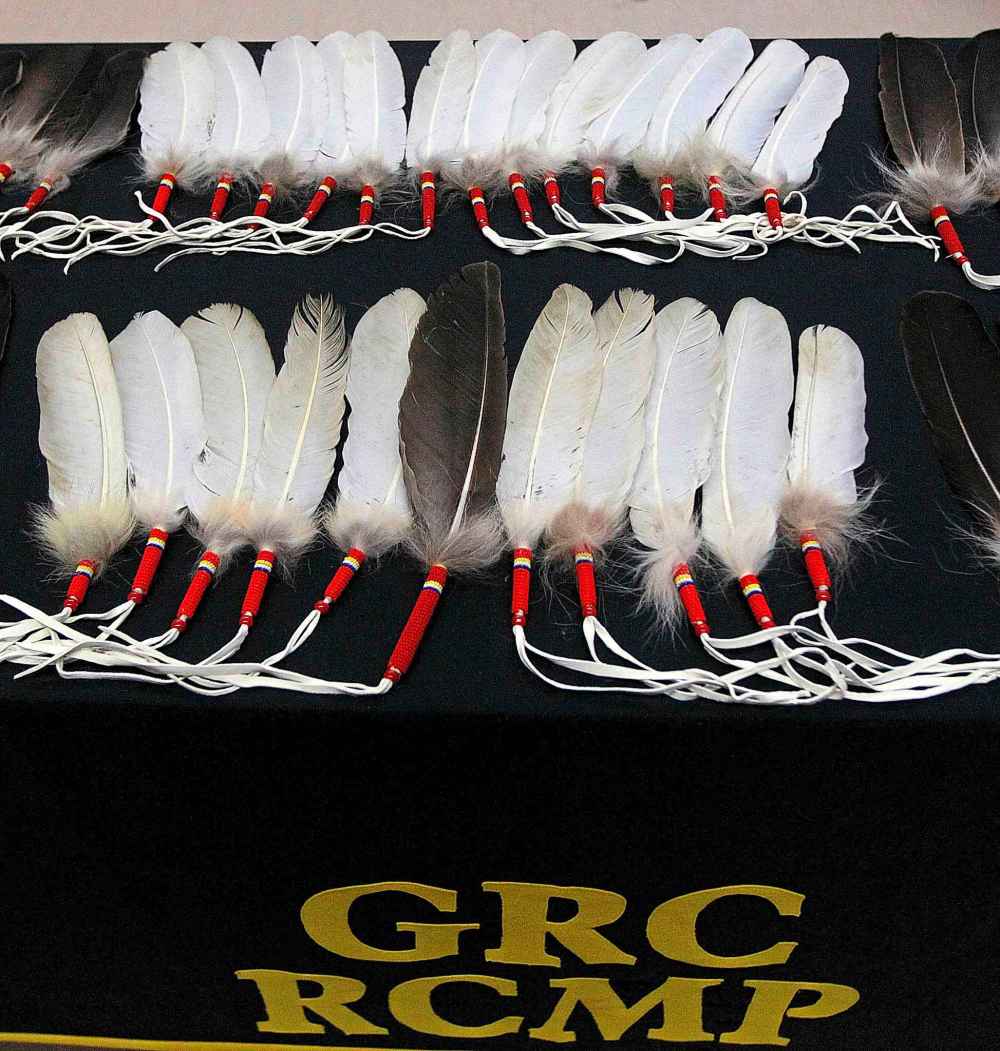
RCMP acquired the feathers from two bald eagles that wildlife officers with Manitoba Sustainable Development provided. The elders helped RCMP with months of ceremonies to prepare feathers for their new official role.
It is illegal to kill eagles in Canada and the United States.
“It’s an important day for us,” Kolody said. “A sacred day.”
Granting the privilege of holding an eagle feather is among the highest honours that can be bestowed among Indigenous peoples, Assembly of First Nations regional chief Kevin Hart said.
The feathers offer both strength and protection. People fast in ceremonies for four days without food or water in four-year cycles just for a chance to carry them, Hart said.
“That shows what we give as First Nations people just to have the honour of holding an eagle feather… this is a big step forward for us,” he said.
First Nations communities are still struggling to come to terms with the inter-generational damage from residential schools and the Canadian legacy of colonialism, Hart said.
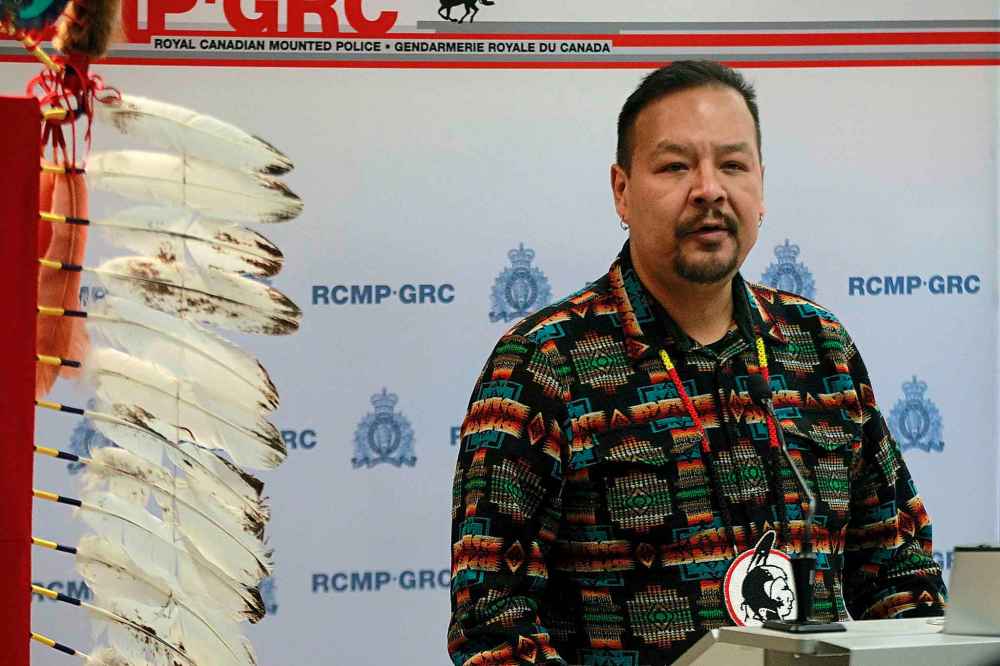
“There’s a traumatic affect in our communities to this day that needs to be reconciled and this is one of those steps,” he said. “It’s great to see this as part of reconciliation.”
The feathers will add to the sense of pride Indigenous members of the RCMP feel about their cultures, he said.
“This is building bridges,” Hart said.
alexandra.paul@freepress.mb.ca
History
Updated on Wednesday, January 23, 2019 9:54 AM CST: Corrects cutlines

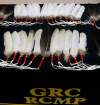

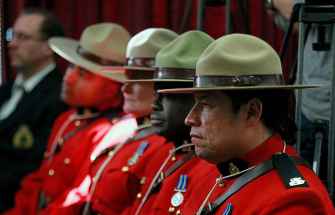
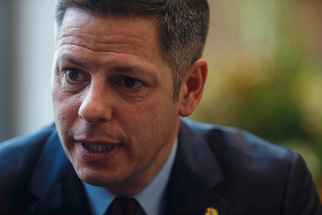


DavidCooper.jpg?h=215)

